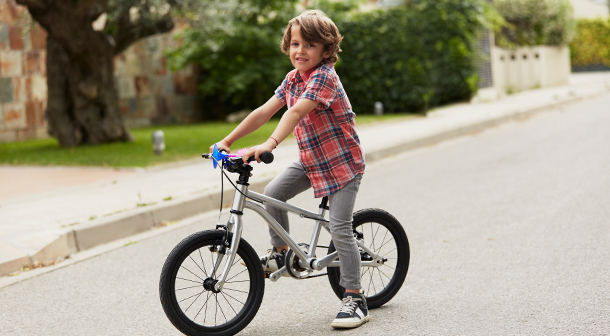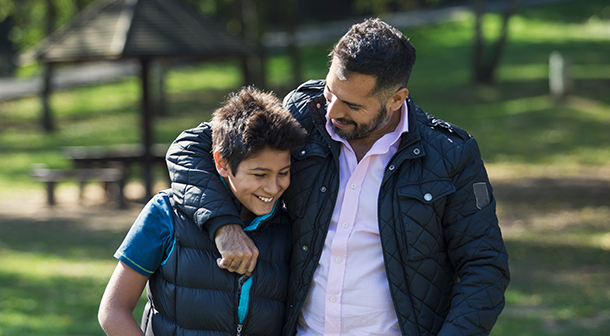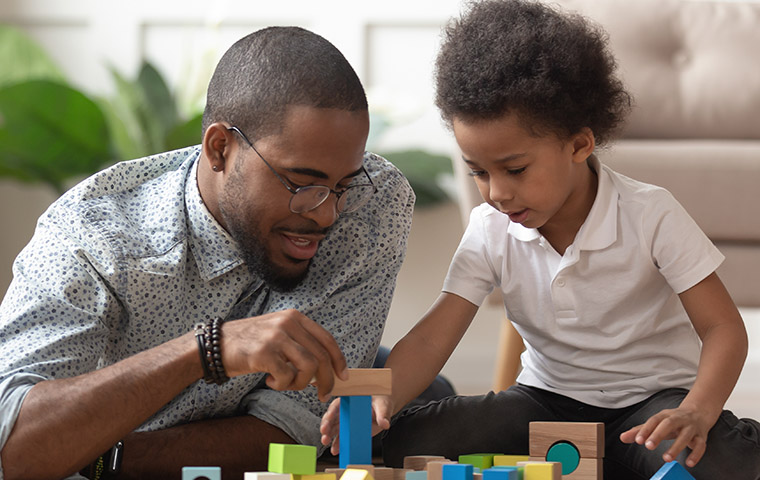What is confidence and why is it important?
We want our kids to do better, go further, and achieve more than we have. We want them to believe in themselves and that they're worthy of the things they want out of life. The good news is that self-confidence and self-esteem are things kids can practice and build on, with your help and guidance. Self-confidence and self-esteem are often confused as being the same thing. They are similar in that they both have to do with how you feel about yourself.
Self-esteem is a measure of how you feel about yourself in general. Self-confidence comes from feeling confident in your abilities, that you are capable. Self-esteem and self-confidence are not about thinking you're better than others, but they describe a sense of security in who you are, that you have self-worth, and that you're able to handle anxious thoughts or challenges as they arise.
Confident children:
- Feel secure (as opposed to insecure).
- Know they have the ability to handle challenges.
- Feel prepared to tackle things like tests, performances, and competitions.
- Are focused on what they can do rather than what they can't.
Don't try to protect your child from anxiety. If your child expresses anxiety or fear about certain activities, don't avoid those feelings. Respect that her (or his) feelings are real and let her know that she can face this fear with you by her side to help. Build her confidence by saying, "I know this is hard, but I also know you will be able to handle this situation and whatever happens."
Confident kids are willing to try new things, are open to new experiences and people, and keep trying when they face setbacks. Building confidence is important because it helps children reach their full potential.

Carl Pickhardt, a psychologist and parenting expert, says children who lack confidence may feel anxiety about failing or disappointing others, which leads them to give up easily and avoid trying new things or challenging themselves. According to Pickhardt, discouragement and fear are two emotions that can keep kids from being confident.
As a parent, you can give your child the support, love, and guidance she needs to grow into a confident adult. In fact, from the very beginning you're helping your child build confidence when you pick her up when she cries and cheer for her when she takes her first steps.
The following tips will help you rear a confident child. Tips by age are detailed later in the article.

Tips for Raising a Confident Child
-
Be a coach.
A coach gives guidance and advice from the sidelines but isn't the one playing the game. As a parent, you are a coach. It's your job to support and cheer your child on, to let her discover what she cares most about and wants to explore, and work with her to overcome challenges and problem-solve when things are hard.
-
Focus on the process rather than the outcome.
Let her learn from her mistakes when she's young and the stakes are low.
-
Build independence.
As hard as it is sometimes, letting your child do age-appropriate things without your help will show her you believe she is capable and you trust in her ability. Let her know you'll be there to help if she has a question - but resist the urge to take over or remove obstacles before she can try on her own.
-
Provide support.
Think of confidence as something you and your child are building together. Support her as she takes baby steps toward building more and more confidence. You can do this by showing her how to do something and then watching her as she does it. The idea is that you give her the tools she needs so she feels like she can overcome challenges on her own.

-
Set them up for success.
Kids learn best from tackling challenges that are appropriate for their age and ability. Help your child attempt challenges that are just a little outside her current ability or comfort zone, but not so far outside that she will just want to give up.
-
Play to their strengths.
Encourage your child to explore her interests. She will build confidence as she discovers her own strengths and talents.
-
Encourage them to keep going.
When your child hits a bump and wants to give up, be the voice that gently nudges her back on track.
-
Praise effort.
This can be a hard habit to break, but try to avoid praising for something your child has no control over. Avoid saying things like, "You are so smart!" Instead focus on the effort your child has put forth by saying something like, "You studied so hard! I am really proud of you."
-
Learn to bounce back from challenges.
When your child expresses anger or frustration, listen and try to understand her feelings. Help her find words to what she is feeling, such as, "This is really hard, isn't?" Acknowledge that her feelings are valid and let her know you understand. Help her address her challenges so she is better prepared to handle them in the future.
-
Don't criticize.
Telling your child what you think she did wrong isn't the best way to help her learn and grow. Ask her how she felt about her mistake and listen to the answers she gives you. Help her think through what she might want to try next time. If she doesn't want to talk about it, wait until she's ready. She'll be much more willing to listen to you when it's her idea.
-
Show confidence.
Have your child watch you tackle new challenges. Share with her how you feel when you do something outside of your comfort zone. She will learn that it's okay to be anxious, scared, excited, or confident, and even to laugh about things when they don't work out the first time. Ask her for ideas about how you could approach your challenge.
Need parenting help now?
The Texas Parent Helpline is available 24/7.
- Call 833-680-0611
- Chat with us
- Text 833-680-0611
It's never too early or too late to build confidence: tips for building confidence at any age.
Babies
- Create a predictable routine. Knowing when to expect a bath, a bottle, or playtime gives babies comfort and a sense of security.
- Respond to your baby's needs. Picking your baby up when she cries and soothing her when she falls shows her she's important to you and that she can rely on you. This not only makes her feel secure, which builds her self-esteem, but it establishes a trusting relationship.
- Provide appropriate challenges. Offer developmentally appropriate toys that are fun challenges for your baby and give her a sense of accomplishment.
- Encourage them to keep going. When your baby struggles to reach for a toy and expresses frustration, resist the urge to grab the toy for her, and encourage her to keep trying. As your baby grows, she'll be trying lots of new skills. Knowing you're there to cheer her on will give her the confidence to keep trying new things.

Toddlers and Preschoolers
- Let them do things independently. As your baby grows into a toddler, she will naturally start to realize she is a separate person from you and able to do things on her own. Nurture her desire to do things for herself, even when it slows you down or frustrates her. Working through these challenges will help her build confidence in her ability to succeed.
- Don't rescue. When your toddler or preschooler expresses frustration over not being able to do something, don't do it for her. Help her problem-solve instead.
- Let them answer for themselves. When someone asks your child a question, give her the chance to respond. Your child may feel shy and not want to speak. If that's the case, don't force her to answer. But giving her the opportunity to respond will show her that people value her opinion.
- Give meaningful praise. Praise is great, but "good job" becomes meaningless if your toddler hears it constantly. Be specific with your praise. Instead of "good job," you could say, "You worked hard to finish that puzzle by yourself!" or "Look how you climbed all the way to the top of the jungle gym! You did it!" Emphasize the accomplishments you want to celebrate with your child. Letting her know you see the hard work she is doing will build her confidence and encourage her to keep trying.
- Encourage healthy risk-taking. It can be scary to watch your toddler explore new things like tall playscapes, but a little (safe) risk-taking will help her learn from mistakes and allows her to feel a sense of accomplishment when she succeeds.
Grade-schoolers
- Spend one-on-one time with your child. At least once a week try to plan an activity where you can give your child your full attention. This is an important way to build trust and grow closer. Your child needs to know you have her back in order to try new things with confidence.
- When appropriate, give your child choices. Being able to choose is empowering. Give your child the option to choose things such as what she has for breakfast and what she wears to school. Try giving her only options that you are okay with. "Do you want eggs or yogurt for breakfast?"
- Don't do everything for your child. The more challenges your child works through on her own the more confident she'll feel the next time she needs to solve a problem.
- Make sure your child knows it's okay to make a mistake. Everyone makes mistakes. Pointing out mistakes you make and how you handle them will help teach your child that mistakes happen to everyone, but how you handle them is what's important. When your child makes a mistake, talk about what she learned and what she could do next.
- Give them age-appropriate chores. Giving your child responsibility shows you think she is capable, which is a big part of building confidence.
- Don't label or compare your child to another child. While it's tempting to identify kids by personality traits, "He's my dreamer and she's my engineer," kids may perceive these labels and comparisons as a limitation on what they should try and what they're good at. Your child is still developing. Let her discover what she loves and wants to pursue.
- Give authentic praise. Praise your child for her hard work and accomplishments, but make it sincere. Kids see right through statements like "You're the best soccer player in the world!" This kind of over-the-top, general praise doesn't build their confidence. Instead be specific and authentic with your praise. "That was awesome when you blocked that goal!"

Adolescents
- Cut them some slack. Early adolescence is a time of rapid growth and change for kids. They are adjusting to a lot and may feel inadequate and awkward at times, which could cause their confidence to take a hit. This is a normal part of adolescence. Keep encouraging your adolescent and be supportive.
- Set them up for success. Build on what your child is already good at. Building confidence comes from experiencing success in overcoming challenges. Suggest activities that will be a challenge but will also make your child feel successful. Don't force your adolescent to do a sport or class she does not want to do. Play to her strengths.
- Let them know you are on their side. Listen when your child wants to talk. Be open to her ideas and opinions.
- Be a safe place for them to vent. Adolescence can be a time of emotional ups and downs. Be a calm, steady presence for your teen to turn to in times of trouble.
- Point out the positive. As your child nears adulthood, the stakes are higher. These are the times when parents tend to criticize more and praise less. Notice when your teen does something well and let her know. Sincere praise from a parent is a big confidence booster.





